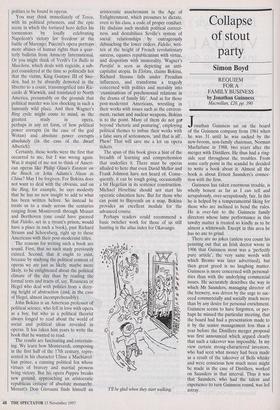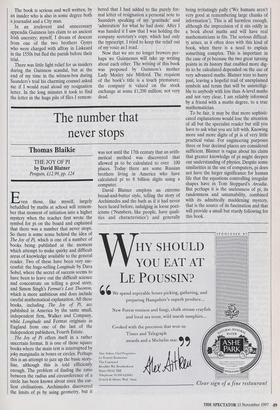Collapse of stout party
Simon Boyd
REQUIEM FOR A FAMILY BUSINESS by Jonathan Guinness Macmillan, £20, pp. 390 Jonathan Guinness sat on the board of the Guinness company from 1961 when he was 31 until he was sacked by the new-broom, non-family chairman, Norman Macfarlane in 1988, two years after the merger with Distillers. He thus had a ring- side seat throughout the troubles. From some early point in the scandal he decided to write a book about it. Almost all the book is about Ernest Saunders's connec- tion with the firm.
Guinness has taken enormous trouble, is wholly honest as far as I can tell and scrupulously, over-scrupulously, fair. In this he is helped by a temperamental liking for those who are inclined to bend the rules. He is over-fair to the Guinness family directors whose lame performance in this tawdry matter is treated so kindly as to be almost a whitewash. Except in this area he has no axe to grind.
There are no jokes (unless you. count his pointing out that an Irish doctor wrote in 1906 that Guinness stout was a 'perfectly pure article', the very same words with which Bromo was later advertised), but then great greed is no laughing matter. Guinness is more concerned with personal- ities than with the underlying commercial issues. He accurately describes the way in which Mr Saunders, managing director of the brewery, was driven by the urge to suc- ceed commercially and socially much more than by any desire for personal enrichment. Guinness seems to have forgotten, or per- haps he missed the particular meeting, that the board had had a presentation made to it by the senior management less than a year before the Distillers merger proposal was first announced which argued clearly that such a takeover was impossible. In my view certain strong-charactered investors, who had seen what money had been made as a result of the takeover of Bells whisky and were conscious how much more might be made in the case of Distillers, worked on Saunders in that interval. Thus it was that Saunders, who had the talent and experience to turn Guinness round, was led astray. The book is serious and well written, by an insider who is also in some degree both a journalist and a City man.
In an irrelevent and unnecessary appendix Guinness lays claim to an ancient Irish ancestry; myself, I dream of descent from one of the two brothers Gynys who were charged with affray in Liskeard in the 1550s but fled the parish before their trial.
There was little light relief for us insiders during the Guinness scandal, but at the end of my time in the witness-box during Saunders's trial his charming counsel asked me if I would read aloud my resignation letter. In the long minutes it took to find the letter in the huge pile of files I remem- bered that I had added to the purely for- mal letter of resignation a personal note to Saunders speaking of my 'gratitude' and `admiration' for what he had done. After I was handed it I saw that I was holding the company secretary's copy, which had only the typescript. I tried to keep the relief out of my voice as I read.
Now that we are no longer brewers per- haps we Guinnesses will take up writing about each other. The writing of this book was proposed by Guinness's mother Lady Mosley née Mitford. The requiem of the book's title is a touch premature; the company is valued on the stock exchange at some £1,200 million; not very dead.











































































 Previous page
Previous page